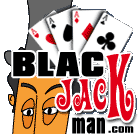

QUICK LINKS
Home
Play Our Game
Rules | Strategies
Terms & Definitions
Bigger Winnings
Online Poker
WEBMASTERS
Make Money
Newbies | Resources

|

A short history of blackjack
Playing cards are believed to have been invented in China sometime around 900 A.D. The Chinese are thought to have originated card games when they began shuffling paper money (another Chinese invention) into various combinations. In China today, the general term for playing cards means "paper tickets". The contemporary 52 card deck used in the United States was originally referred to as the "French Pack" (circa 1600's) which was later adopted by the English and subsequently the Americans.
The first accounts of gambling take place in 2300 B.C. or so, and the Chinese again get the credit. Gambling was very popular in Ancient Greece (even though it was illegal) and has been a part of the human experience ever since.
The history of the blackjack card game itself probably spawned from other French games such as "chemin de fer" and "French Ferme". BlackJack originated in French casinos around 1700 where it was called "vingt-et-un" and has been played in the U.S. since the 1800's. Blackjack is named as such because if a player got a Jack of Spades and an Ace of Spades as the first two cards, the player was additionally remunerated.
Gambling was legal in the western States from the 1850's to 1910, at which time Nevada made it a felony to operate a gambling game. In 1931, Nevada re-legalized casino gambling, and blackjack became one of the primary games of chance offered to gamblers. 1978 was the year casino gambling was legalized in Atlantic City, New Jersey. Since then, about 20 states have had a number of small time casinos sprout up. Nearly a hundred Native American Indian reservations operate or are building casinos as well.
In addition to the United States, countries operating casinos include France, England, Monaco (Monte Carlo of course) and quite a few in the Caribbean islands.
The first recognized effort to apply mathematics to blackjack culminated in 1956 with Roger Baldwin's paper, published in the Journal of the American Statistical Association, titled "The Optimum Strategy in Blackjack". Using calculators and probability and statistics theory, Baldwin wrote of ways to substantially reduce the house advantage. Although the title of the paper was 'optimum strategy', it wasn't really the best strategy because they needed a computer to refine their system.
Professor Edward O. Thorp picked up where Baldwin left off. In 1962, Thorp refined the basic strategy and developed the first card counting techniques. He published his results in "Beat the Dealer", a book that became so popular that for a week in 1963 it was on the New York Times best seller list.
The casinos were so affected by "Beat the Dealer" that they began to change the rules of the game to make if more difficult for the players to win. The unfavorable rules resulted in a loss of income for the casinos, so they quickly reverted back to their original rules. As Thorp's "ten count" method wasn't easy to master and many people didn't really understand it anyway, the casinos made a bundle from the game's newly gained popularity.
Another major contributor in the history of blackjack is Julian Braun, who worked at IBM. His thousands of lines of computer code and hours of simulation on IBM mainframes resulted in the basic strategy, and a number of card counting techniques. His conclusions were used in a second edition of Beat the Dealer, and later in Lawrence Revere's 1977 book "Playing BlackJack as a Business".
Ken Uston used five computers that were built into the shoes of members of his playing team in 1977. Predictably, they won over a hundred thousand dollars in a very short time, but one of the computers was confiscated and sent to the FBI. The feds decided that the computer used public information on blackjack, and so was not a cheating device. Ken was also featured on a 1981 Sixty Minutes show and helped lead a successful legal challenge to prevent Atlantic City casinos from barring card counters.

[ HOME ] [ ] [ PLAY OUR GAME ]
|




